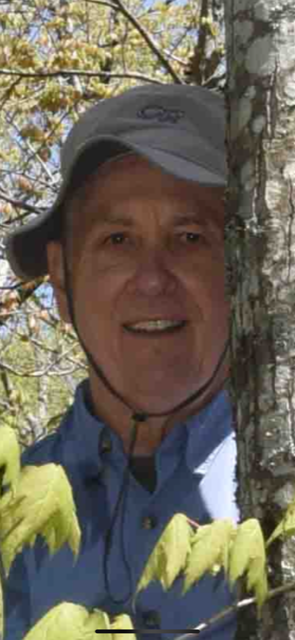
Scott Brunger
Scott Brunger, author of A Trade in Death
Essay on writing an Economics Murder Mystery by Scott Brunger
Writing my novel
In my thirty years as an economics professor at Maryville College, I wrote several books of which the most enjoyable was “A Trade in Death, an Economics Murder Mystery.” This economics murder mystery genre had developed during the 1980s as American economists tried to interest students in applying theories to real life. Unfortunately, after economists had published thirty-seven [my count] different titles, they overstocked the market and prices fell, so publishers abandoned the genre for the next three decades.
I enjoyed writing fiction for several reasons. The biggest was that in the evening after preparing technical lessons in my discipline, I found my imagination stimulated by the blank pages on my computer. My wife would enjoy my giggling at my latest paragraphs, a reaction that never happened in the serious discipline of economics. I was also very attached to my novel’s characters, most notably the economist who solves the murder eventually. The typical economist sleuth would be a visitor in a remote Caribbean resort who would gather the rich guests together afterwards and dazzle them with his logic, like Miss Marple. As a rich economist, he ignored the colonial situation of the resort staff.
The model for my economist was a Kenyan sociologist with whom I traveled to six different countries evaluating local development projects sponsored by the YMCA of the USA. We spent two months visiting Senegal, Gambia, and Togo in West Africa, Kenya and Uganda in East Africa, and Zambia in southern Africa interviewing village chiefs, men, women and youth to find out whether projects were sustainable and could be scaled up.
In West Africa he observed that “These people have so much culture!” by which he meant West Africans wore bright African cotton clothes, greeted each other with elaborate ceremony, and entertained extravagantly. Later in East Africa, I had culture shock, particularly because people ignored my presence, a behavior that in West Africa would precede unrest. From my sociologist friend, I learned that Africans in unfamiliar areas must do all the mental processing that an American volunteer does to figure out what is happening in a strange culture. In my murder mystery, the Kenyan economist cannot rely on cultural similarities but must consciously process his observations.
I was processing international politics as I wrote my murder mystery in 1989, just as the Cold War was ending. The United States had supported African independence as long as the new governments did not try to develop communism. Many new African governments permitted their chiefs to claim valuable village land as their own in order to export tropical cocoa, coffee, palm oil, vanilla, etc. for personal gain. Western nations bribed these African governments to give favorable contracts and trade opportunities to our companies. As I wrote my mystery, I began to see how high the cost of corruption weighed on African peoples and how in the name of patriotism, American economists had politely ignored it.
Publishing my novel
I finished my novel and tested the first version “Murder in Miseria” in two courses, Economics of Development and African Studies. Students said they liked it better than “other economics readings” and they answered questions well. Now that the book was in circulation, I protected my claim with the Poor Man’s Copyright, sending it to myself by certified mail. The English Department complimented me, despite my trespass into their domain. That year their department organized a weekend seminar for budding writers, led by a professional editor from a Presbyterian press. He kindly offered to be my agent, even after I warned him that the market for economics murder mysteries was cluttered. During two years he marketed my manuscript among at least seven publishers who sent rejection letters. Most rejections were about how the book intersected too many book categories: murder, travel in Africa, religion and economic development. Book sellers would not know which shelf to put it on. One New York publisher said my book was too Christian!
After two years of working on my behalf, my agent regretfully freed me from our contract. His work was fruitful, because he placed a copy of my mystery at the Friendship Press of the National Council of Churches. Two of their themes for the following year were economic development and Africa. That the main character was a Kenyan Presbyterian was an added plus! With minimal editing and a new title, “A Trade in Death,” they were ready to publish.
Scott Brunger, PhD, Maryville College 1982-2013, brunger@mindspring.com


